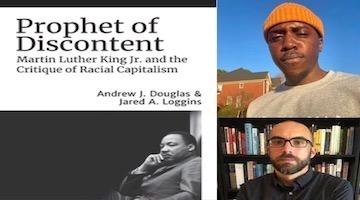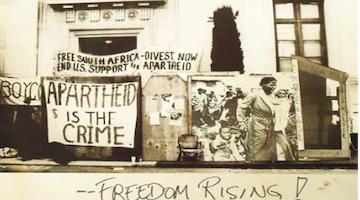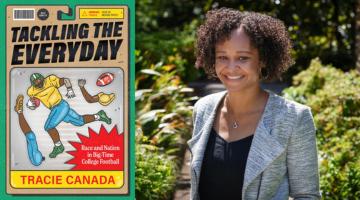“The Panthers spoke out about the ravages of capitalism and aligned themselves with anti-imperialist and anti-colonial forces from Vietnam to South Africa to Palestine.”
In this series, we ask acclaimed authors to answer five questions about their book. This week’s featured author is Robyn C. Spencer. Spencer is Associate Professor of History at Lehman College, City University of New York. Her book is The Revolution Has Come: Black Power, Gender, and the Black Panther Party in Oakland.
Roberto Sirvent: How can your book help BAR readers understand the current political and social climate?
Robyn Spencer:The Sixties were a time of radical audacity when activists reimagined hierarchies and boundaries of all kinds and built organizations aimed at changing the world. It was also a time of radical re-education. People hungered for books and debated the ideas of global freedom fighters in the university of the streets. That unruliness and discipline are needed today to fight back against the fascism and warmongering threatening to swallow us all.
The Revolution Has Come reinforces the centrality of the Black radical political tradition and the day to day sacrifices made by ordinary men and women which made organizations like the Black Panther Party possible. Founded in 1966 by Huey Newton and Bobby Seale, the Black Panthers would grow to be one of the leading organizations of the Black Power movement. A close-up look at the evolution of the Oakland Panthers’ strategies and tactics can assist todays activists in the process of organizational building. While it may seem like there is a blizzard of issues and concerns to address today in the context of the retrenchment of the Trump administration, the Panthers’ history demonstrates the myriad ways the organization took aim at deeply rooted structural inequality and built broad alliances with radical whites and other people of color in the process. The Panthers spoke out about the ravages of capitalism and aligned themselves with anti-imperialist and anti-colonial forces from Vietnam to South Africa to Palestine. Women were at the forefront of these efforts in the 1960s, just as they are at the forefront of the movements today. The Revolution Has Comeis the antidote to feeling atomized or powerless and reminds readers of the beautiful power of collective action.
What do you hope activists and community organizers will take away from reading your book?
The Revolution Has Come holds up a mirror to the Panthers’ inner organizational life and demystifies the meaning of membership. Readers learn that the BPP had rules and structure and that they blended political education with social service, art, music, radical journalism, electoral politics and community control in the attempt to gain more freedom for marginalized groups. They see the ideology of the organization shifting and changing over time in response to the material conditions being faced. And they learn about the unrelenting and multifaceted campaign of repression against the BPP and how they dealt with the onslaught. I hope that the lessons drawn from the Panthers’ history inspires people to join organizations aimed at structural transformation, recommit to radical political education and the serious study of ideas, and engage in more face to face organizing—all the while remaining vigilant against state political repression.
We know readers will learn a lot from your book, but what do you hope readers will un-learn? In other words, is there a particular ideology you’re hoping to dismantle?
I wanted to dismantle the Great Man theory of history. Few will claim adherence to this school of thought, but it is alive and well in the study of the history of the Black freedom movement where men’s stories are all too often positioned as universal. In telling the story of women and men working together in tension and tandem to build a revolutionary vehicle for social change, I wanted to provide an alternative narrative. Women joined the Black Panther Party in numbers that sometimes surpassed men. They pushed the organization to accommodate their identities as mothers, fought against sexism and misogyny in the ranks of the organization and played key roles in the organization’s newspaper, community programs and PE structures. Kathleen Cleaver played a major role as Panther spokesperson and architect of the Free Huey campaign. Phyllis Jackson was a key organizer of the Panthers’ electoral strategy. Connie Matthews’ transnational activism helped to solidify the Panthers support base in Europe. I hope that readers will relish the many ways that Panther women contributed the history of Black Power and increasingly interrogate male-dominated stories of the past, understanding that often women are hidden in plain sight.
Who are the intellectual heroes that inspire your work?
As an undergraduate history major at SUNY Binghamton I was lucky enough to be exposed early in my career to the brilliant work of Dr. Elsa Barkley Brown and Dr. Carole Boyce Davies. Dr. Barkley Brown’s methodological approach to history has provided a framework for understanding African American political culture. Her essays in Sage: A Scholarly Journal on Black Women were foundational reads that gave me permission to go beyond my training to my real-world experiences in Black communities in conceptualizing my area of study. Dr. Barkley Brown gave me the kitchen table as a theoretical space of radical possibility. Dr. Boyce Davies gave me Black literature. It was in her class that the world of Black novelists, essayists and poets opened to me. My work has been informed by the literary frameworks that I gathered from thinkers like June Jordan, Gloria Naylor and Toni Morrison. In addition, Dr. Davies’ work on Claudia Jones has been a model of how to understand Black women as thinkers.
“I hoped to bring to life the history of the Black Panthers in a way that was humanizing and respectful, yet rigorously critical.”
I read everything Robin D.G. Kelley writes because of his deep engagement with contemporary politics and his commitment to excavating the stories of Black grassroots political actors, especially the Black left. I’ve Got the Light of Freedom: The Organizing Tradition in the Mississippi Civil Rights Movement by Charles Payne had a pivotal impact on my thinking. I hoped to bring to life the history of the Black Panthers in a way that was humanizing and respectful, yet rigorously critical as he did in his seminal book. I am inspired by too many political activists to name. Black labor radical General Baker, radical democrat Ella Baker and communist feminist Angela Davis are especially close to my heart.
In what way does your book help us imagine new worlds?
The women and men who joined the Black Panther Party did more than imagine new worlds—they tried to build them. Audaciously, they called out the police brutality and state violence that plagued Black communities and renamed their oppressors as pigs. They adapted to political exigencies—toggling between third party politics to an alliance with the Democratic party. When they needed to broaden their base they pursued coalition politics and embraced spirituality. Boldly, they collectivized childcare. They didn’t just try to change the world, they tried to change themselves. Despite a vicious campaign of repression and devastating political schisms, they maintained the power to name the forces arrayed against them and the right to struggle. They dared to dream of freedom and embrace joy. They were armed with more than their weapons and with more than their imaginations. They were armored by the history of the long Black freedom struggle. Obscuring the broad strokes and granular details of this organizing tradition is part and parcel of the misesducation endemic in US public schools. By writing the history of the Black Panther Party in Oakland, I hope to have expanded the sense of political possibility and unearthed a blueprint of organizing that deserves serious interrogation.
Roberto Sirvent is Professor of Political and Social Ethics at Hope International University in Fullerton, CA. He also serves as the Outreach and Mentoring Coordinator for the Political Theology Network. He’s currently writing a book with fellow BAR contributor Danny Haiphong called American Exceptionalism and American Innocence: The Fake News of Wall Street, White Supremacy, and the U.S. War Machine.
YOUR COMMENTS ARE INVITED...
Please join the conversation on Black Agenda Report's Facebook page at http://facebook.com/blackagendareport



















